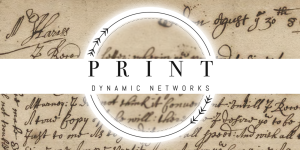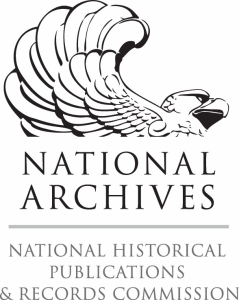
People, Religion, Information Networks, and Travel, or PRINT, an academic initiative housed in the history department at the University of Central Florida, has been awarded a substantial grant of $330,253 by the National Historical Publications and Records Commission (NHPRC), which the UCF College of Arts and Humanities is matching dollar-for-dollar. This Major Collaborative Archival Initiative grant, awarded by a branch of the U.S. National Archives, will propel the PRINT portal towards its mission: to shed new light on the intricate history of early modern migration in the Atlantic world.
PRINT is a collaborative project dedicated to mapping the communication networks of early modern European religious minorities and tracing their influence on the dynamic patterns of migration in the Atlantic world. Originally evolving to address issues of religious intolerance, the connections took on a life of their own as people with different interests used them to funnel information about the logistics of movement and mobility. PRINT explores history through the lens of interconnectedness and resilience.
Rosalind Beiler, associate professor of history and co-principal investigator of the PRINT Project, in partnership with Amy Giroux, associate director of the Center for Humanities and Digital Research, is spearheading this endeavor. “The PRINT portal is pioneering,” Beiler says. “It will make accessible a digital collection of manuscript correspondence sourced from archives in five different repositories, spanning four distinct countries, and written in three languages. What makes PRINT truly unique is its commitment to transcending national library and archive cataloging standards.”
The grant will be allocated over a three-year period and will support student efforts to process images, conduct research and create metadata from these historical letters. It also ushers in several groundbreaking aspects for the PRINT Project:
- Customized Metadata: PRINT will adapt metadata to adhere to four different national standards, ensuring precise categorization and organization of the historical documents, catering to both libraries and archives.
- Citizen Scholars: Citizen scholars will play an integral role in the project by transcribing and translating the documents on Zooniverse, democratizing access to this invaluable historical material.
- Linked Open Data: In collaboration with UCF librarians, PRINT will establish national-level authority files for people and places, creating seamless connections between authors mentioned in the letters and corresponding names in other collections around the world. This innovation enables data linkage across national systems and repositories, providing clarity on individuals, locations, and events across time and place.
- Global Accessibility: PRINT will work with UCF librarians to distribute transcriptions, metadata, and linked open data, making it accessible on a global scale.
- Automated Metadata Pipeline: PRINT will develop an automated system for processing data and making it globally accessible, streamlining the research process and enhancing user experience.
In addition to these initiatives, PRINT will also introduce a mapping tool to query and map the connections found in the historical documents, further enhancing the discoverability of the manuscripts and their usefulness for researchers and scholars.
PRINT’s receipt of this grant from NHPRC showcases its commitment to studying early modern migration history. By breaking down national barriers and embracing innovative approaches to historical research, PRINT is poised to revolutionize our understanding of the past. This grant is a significant step toward preserving the legacy of early modern migrants – in this case, religious minorities – and ensuring their stories resonate with a global audience.
For more information about the PRINT Project and its initiatives, visit chdr.cah.ucf.edu/print.
